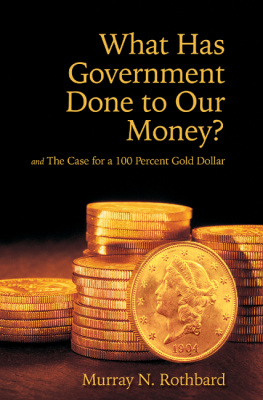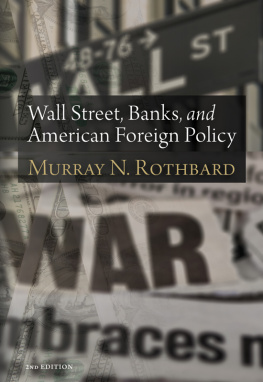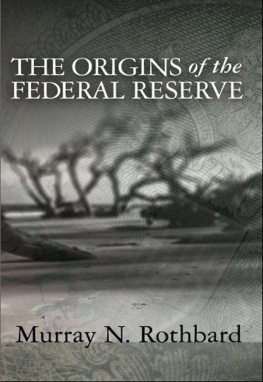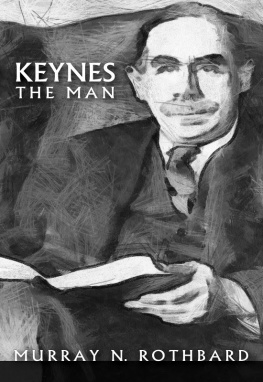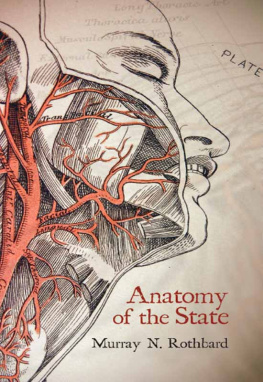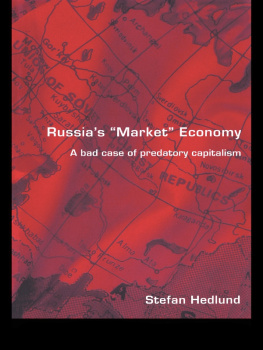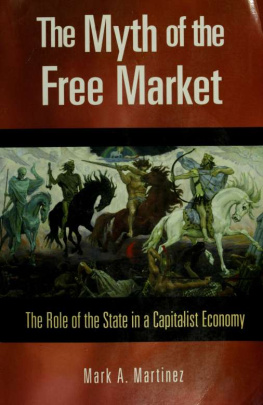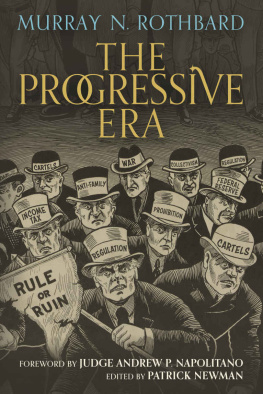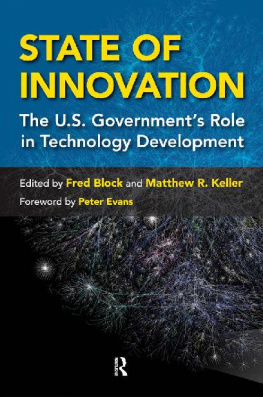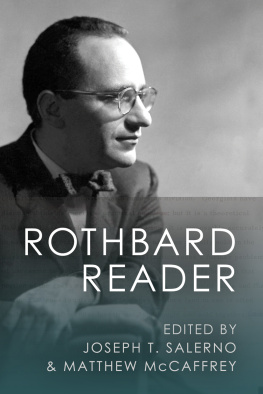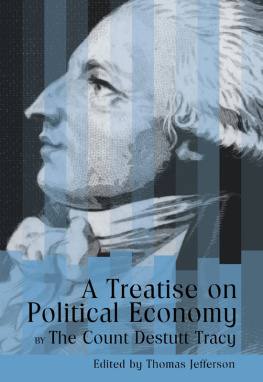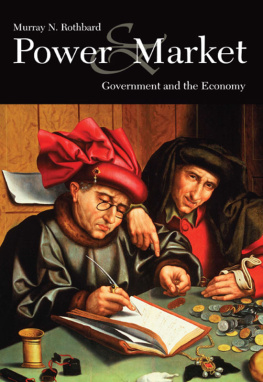The Ludwig von Mises Institute dedicates this volume
to all of its generous donors
and wishes to thank these Patrons, in particular:
George W. Connell
________________
Andreas Acavalos, Mr. and Mrs. David Baumgardner, Richard Bleiberg,
John Hamilton Bolstad, Louis Carabini (Monex International),
Christopher P. Condon, Anthony Deden (Sage Capital Zurich AG),
Mrs. Floy Johnson, Neil Kaethler, Mr. and Mrs. R. Nelson Nash
________________
Mr. and Mrs. J.R. Bost, Dr. John Brtland, William H. Conn,
Carl Creager, Dr. and Mrs. George G. Eddy, Douglas E. French,
John R. Harper, Roland Manarin, Ronald Mandle,
Mr. and Mrs. William W. Massey, Jr., Hall McAdams,
E.H. Morse, Edward W. Rehak, Donald Mosby Rembert,
Thomas S. Ross, Dr. Tito Tettamanti, Jan Tucker,
Joe Vierra, Dr. Jim Walker
________________
Anonymous, Toby Baxendale, Robert Blumen, Tobin Campbell,
Dr. John P. Cochran, John Cooke, Kerry E. Cutter,
D. Allen and Sandra Dalton, Rosemary D'Augusta (Perna Travel),
James V. De Santo (DTL Inc.), Capt. and Mrs. Maino des Granges,
Frank Van Dun, Eric Englund, Charles Ezell, Martin Garfinkel,
Mr. and Mrs. Thomas E. Gee, Frank W. Heemstra, Jule R. Herbert, Jr.,
L. Charles Hilton, Jr., Mr. and Mrs. Max Hocutt, Keith A. Homan,
Julia Irons, George D. Jacobs, M.D., Dr. Preston W. Keith,
Robert N. Kennedy, Richard J. Kossmann, M.D., David Kramer,
Steven R. Krause, John Leger, Arthur L. Loeb, Bjrn Lundahl,
Samuel Medrano, M.D., Frederick L. Maier, Dr. Douglas Mailly,
Steven R. McConnell, Joseph Edward Paul Melville, Roy G. Michell, Jr.,
Dr. Dorothy Donnelley Moller, Reed W. Mower, Ron N. Neff,
Christopher P. O'Hagan, Mr. and Mrs. Stanley E. Porter,
Thomas H. Reed, James A. Reichert, Michael Robb, Conrad Schneiker,
Alvin See, Mr. and Mrs. Thomas W. Singleton (Nehemiah Foundation),
Carlton M. Smith, Kent Snyder, Geb Sommer, William V. Stephens,
Charles Strong, Michael F. Thomas, Mr. and Mrs. James Tusty,
Mr. and Mrs. Quinten E. Ward, Thomas Winar,
Dr. Steven Lee Yamshon, Mr. and Mrs. Leland L. Young,
Robert S. Young
INTRODUCTION TO
THE SECOND EDITION OF
MAN, ECONOMY, AND STATE
WITH POWER AND MARKET
MURRAY ROTHBARD BEGAN WORK ON this magnum opus on January 1, 1952.view of the progressive degeneration of economic thought throughout the 1950s, the eventual publication of Rothbard's treatise in 1962 was a milestone in the development of sound economic theory and an event that rescued the science from self-destruction.
The era of modern economics emerged with the publication of Carl Menger's seminal work, Principles of Economics, in 1871. In this slim book, Menger set forth the correct approach to theoretical research in economics and elaborated some of its immediate implications. In particular, Menger sought to identify the causal laws determining the prices that he observed being paid daily in actual markets.prices, rents, wage, and interest rates were the outcome of the value judgments of individual consumers who chose between concrete units of different goods according to their subjective values or marginal utilities to use the term coined by his student Friedrich Wieser. With this insight was born modern economics.
Menger's causal-realist approach to economic theorizing quickly began to attract outstanding followers both in Austria and, later, throughout Continental Europe and the Anglophone countries. What came to be called the Austrian School grew rapidly in prestige and numbers and by World War I theoretical research based on the causal-realist approach was considered the cutting edge of economic science. For various reasons, the school suffered an amazingly rapid decline, especially in Great Britain and the United States but also in Austria, after the war. By the 1920s, the causal-realist approach had been overshadowed by the partial equilibrium approach of Alfred Marshall in Great Britain, the U.S., and even parts of Continental Europe. Its star fell further with the importation of the mathematical general equilibrium approach of Lon Walras into the English-speaking world in the early 1930s. A little later Menger's approach was nearly buried by the Keynesian Revolution. Hence, by the advent of World War Two there ceased to be a self-conscious, institutionally-embedded network of economists actively engaged in teaching and research in the Mengerian tra-dition.
After World War II, a new and stifling orthodoxy known as the neoclassical synthesis had descended upon economics, especially in the United States. This so-called synthesis was actually a hodgepodge of the three disparate approaches that had overwhelmed the Mengerian causal-realist approach in the interwar period. It jumbled together the Marshallian and Wal-rasian approaches to price determination with Keynesian macroeconomics. The first two approaches focused narrowly on analyzing the determination of unreal, equilibrium prices either in single markets (partial equilibrium) or in all markets simultaneously (general equilibrium). Keynesian macroeconomics denied the efficacy of the price system altogether in coordinating the various sectors of an economy confronted with the failure of aggregate demand. This latter condition was supposed to have caused the Great Depression and was further alleged by Keynes and his followers to be an endemic feature of the market economy. The neoclassical synthesis thus proclaimed that the price system worked efficiently to allocate scarce resources only if the government deftly employed fiscal and monetary policies to maintain a level of aggregate demand or total spending in the economy that was sufficient to absorb a full employment level of output.
This new orthodoxy also promoted hyper-specialization and a corresponding disintegration of economic science into a clutter of compartmentalized sub-disciplines. Even the theoretical core of economics was now split into microeconomics and macroeconomics, which had seemingly very little connection to each another. Specialized journals proliferated and resulted in a radical change in the research culture, with a premium on the writing and reading of the latest journal articles. The few books that were published were technical monographs or dumbed-down textbooks; the era of the great systematic treatise on economic theory was at a close.


